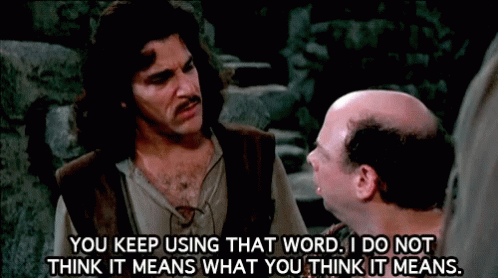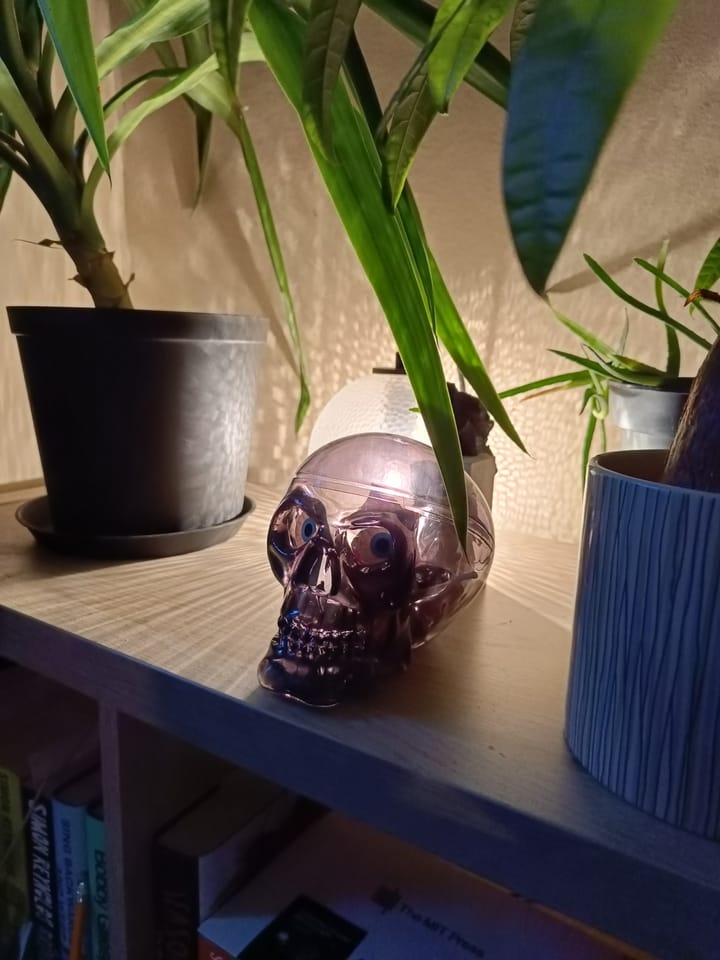week 41 / 2025: stuck in the middle with you
In which I channel my inner Inigo Montoya in an attempt to explain why talking about "technology" robs us of the sense of our own agency...

“If you got a job / you can be an agent / you can work for revolution / from your place of employment...”
This week I’ve been thinking about agency.
I chose the name of this journal/website quite purposefully; the “worldbuilding” bit should be self-explanatory at this point, at least of you’ve been following along for a while, but “agency” is doing double work. It positions the business behind the blogging as fundamentally facilitatory—we will help you with worldbuilding, much as a travel agency might help you with travel!—but it also forms a dyad with the other term, which maps roughly to the dyad on which I’ve been harping a lot of late: worldbuilding tends more toward the abstract end of futuring, while agency matters more where the wheels meet the (figurative, but also literal) concrete.
That division is not a strict binary, to be clear. As I keep saying, the oscillation between those two relationships to any given imagined future is the real work—and so a lot of what I’m about is the insistence that worldbuilding be brought down to the ground of human subjectivity. The opposite move is perhaps less discussed: the insistence that agency—which we might define as the capacity to act and, through action, influence our circumstances—be pushed back up to the systemic end of the spectrum. (The centripetal swirl of the yin-yang, once again.)
Rhetorically, however, this is far from a given. Agency’s enemies are various determinisms, of which there are many, but the most pressing (perhaps because most dominant) is technological determinism: the metanarrative that tells us that “progress” is to a considerable degree a function of the accumulation of technological artefacts in society, and that this accumulation is both unstoppable and in some sense self-directed. Technological determinism comes in two flavours, depending on how the subject relates to that supposedly relentless arc of implied change: it may be celebrated, even worshipped, or it may be resented. What is common to these two affective positions is the underlying sense of inevitability: the story is that technology will advance, will accumulate, will (re)shape the ways in which we live.
In other words, an agency is being ascribed to this thing we call “technology”; we have assigned it a capacity to act and to influence the circumstances. In doing so, we have tacitly surrendered or disavowed our own agency, to a lesser or greater degree.
In a number of recent conversations, I have found myself paraphrasing the very neat way that David Edgerton’s Shock of the Old describes this phenomenon, which is rooted in the surging ubiquity of the word itself. “Technology” as we say it today—as a collective or categorical noun that encompasses a vast array of machines and devices, and (confusingly) the functions and applications thereof—is a relatively recent term but, as the “-ology” suffix implies, it was originally more like a verb.

In the introduction to the new edition of his book, Edgerton takes himself to task for using the term overmuch, having realised that in doing so he was unintentionally sustaining the problem he was attempting to diagnose. I have been paraphrasing his argument as saying that, when we talk of “technology” in the way that we do, we effectively separate the things we humans do from the things with which we do them. As a result, those things are detached from the intention with which they were made; rather than being means to various ends, they become ends in and of themselves. “Technology” somehow went from being “(the study of) the ways in which we make and use things to achieve various outcomes”, to being “things that achieve outcomes which are innate to them”.
This split is why certain schools of scholarship insist on the term “sociotechnical” when discussing change. To talk of purely technological change is to detach human action from the flow of events: suddenly, “technology” is over there, changing and developing, and we’re over here, passively observing those changes and developments. That this supposedly objective attitude to change—in which the observer sets themselves outside of the world they are attempting to understand—is the essence of the episteme that we (somewhat unfairly, and certainly inaccurately) think of as “scientific” is not coincidental.
(For those hovering over their bingo cards, awaiting the now-traditional weekly invocation of Saint Donna: yes, this is exactly what Haraway referred to as the “god trick” of technoscience.)
Regrettably, identifying the problem is not sufficient to solve it. Edgerton’s failure to avoid using a term which he understood to be not only unhelpful but also actively contributive to the issue at hand is illustrative. I’m thinking also of my own attempts to purge my own conversation and writing of references to “the future”, a term and concept which I believe to have a very similar effect to that I’ve just ascribed to “technology”. Training yourself not to use a term or concept in the way you want to suppress is not even half the battle; the real struggle emerges when one tries to explain the term’s absence and problematics to an interlocutor who likely doesn’t spend hours of every day thinking about this sort of stuff. Even separating the label from that which it labels is an uphill struggle: try explaining that the problem isn’t the category of things that we call “technology” so much as the fact that we categorise and label those things as distinct from ourselves to the hypothetical man on the Clapham omnibus! The struggle seems insurmountable.
Note also that this sense of struggle is remarkably similar to the determinism that accompanies the notion of “technology”: as I consider the vast linguistic and discursive and socioeconomic systems in which I am embedded, my sense of my own agency disappears, dwarfed and humbled in the face of the conceptual sublime conjured by the looming alpine vastness of structural forces.
It would be nice to end this train of thought with a neat solution, but I am not capable of it. That said, I will argue that the use of narrative-based approaches to futuring can go some way to portraying and thus (re)asserting the presence of human agency in the flow of change—because, make no mistake, we still have agency, even though we have come to feel like we don’t.
But stories alone cannot change the world, much as it would be nice to pretend otherwise. That’s the whole point: people change the world, because it is people that do things, not “technology” (nor “discourses”, nor “economics”). I’m increasingly convinced that it is not my responsibility to change the world, anyway—nor anyone else’s! That sense of frustrated responsibility is the flipside of the agential paradox I’ve just been discussing, and provides a particular shape to the feeling of powerlessness. However, we are responsible for our own actions, though, and for our interactions… and by paying attention to these elements of our agency, we can change the bits of the world to which we are connected.
Perhaps it’s here, at scale somewhere between that of the atomised individual and that of the systemic abstractions that we have spoken and written into existence, that we can affect our circumstances, consciously and collectively.
reading
This week has mostly seen me finishing off Rogan’s excellent Fall of the Ottomans, as discussed last week, and I have yet to settle into a new “dominant read”. Perhaps the bookworms among the WA readership would like to pipe up with comments about what they’re reading right now? Click on through to the site to leave a note, if you fancy it; our operators are waiting for your call, etc etc.
a clipping
Via the inestimable John Willshire comes this long talk transcript by one Duncan Brown. I have been purposefully avoiding reading and sharing material specific to the seemingly interminable “AI” discourse, for reasons which the ramblings above may go some way to explaining! But Brown’s discussion of the actual utility of LLMs in the context of large software project management starts from a discussion of the inevitability with which they are positioned in the business landscape, and goes to some very interesting places along the way; it was such a good fit with today's essay that it seemed the obvious choice.
I led a project which took full advantage of AI’s production tools, only to run heavily and terminally aground on organisational governance and confused expectations in the department with which we were engaging. In that situation there was literally no quantity of artefacts that would have helped.
Whilst this failure is a little disappointing, it’s interesting to observe that this doesn’t work. It’s signal. We can now say: we live in a world, sorry, an “emerging reality”, where we can have [waves hand] anything at any time to a basic level of competence, and all of the real problems, the “people problems” still exist. And this is finally proof positive, hard evidence, that artefacts are not really what we’re here for. We are demonstrably optimising about a mile from the bottleneck. AI may be giving you a million prototypes, but if you listen, AI is telling you in quite a painful way that being able to get feedback on your artefacts is much, much more important than the artefacts themselves.
ticked off
- Fifteen hours of admyn. (Some of this is correspondence, but a deal more of it is an ongoing project to build a process for managing my correspondence and making time for it in a way that stops it periodically eating entire days at a time. Plus all the usual admynistrivia, natch, and some out-of-town travel and meetings about potential new projects and gigs.)
- Five hours on PROJECT PORTON. (Like the last jump-scare revenant in a zombie movie whose director should have cut it at least three minutes shorter, PORTON has been shuffling across the scene yet again... and will likely make one last twitching attempt to rise next week.)
- Four hours on PROJECT PONTIF. (Rebooting the book project after a long period of leaving it fallow, for reasons of busyness. Undirected writing is very important to my process, but it’s easy to forget the pleasure that comes from writing with a particular project in mind. It’s also regrettably hard to protect the time for doing it from more pressing economic imperatives.)
- Three hours of art-related research. (In order to do collage, you’ve got to know what materials you’ve got, and then allow yourself to rabbithole away and think about how those materials might be used or combined in a particular piece or sequence. At least, that’s how it works for me.)
- Two hours on PROJECT FLATPACK. (The sort of meeting that you wish could be the template for all meetings in all projects: everyone leaves feeling like they got what they needed and that they know where the thing is going.)
- Two hours of kinmaking. (See below.)
- Ten hours of undirected writing and reading, as always.
kinmaking
The October instalment of Malmö Futures Folk was a pleasure, as always. We’re doing it again on Wednesday 5th November, so do come along if you’re in town; sometimes we talk shop, sometimes we don’t, but we sure do talk!
OK, that’s everything. I hope all is well with you, wherever you may be.
This has been the Worldbuilding Agency weeknotes for Week 41 of 2025. Thanks for reading! If you've enjoyed them, it's free to subscribe. If you are already subscribed, please send to a friend who you think might also like it!





Comments ()